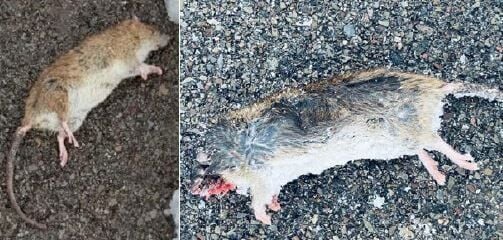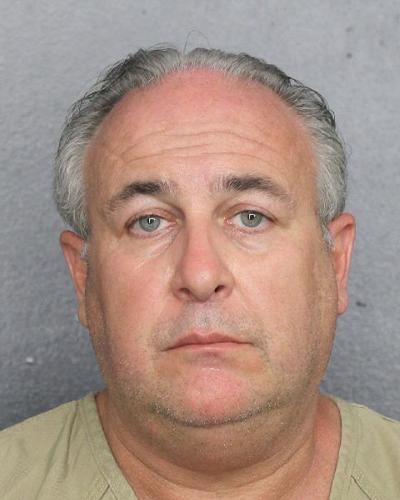Dead rats the government says were meant to intimidate a witness appear to have helped keep strip club owner Peter G. Gerace Jr. incarcerated ahead of his bribery, sex- and drug-trafficking trial.
U.S. District Judge John L. Sinatra Jr., in his written ruling Tuesday keeping the Pharaoh's Gentlemen's Club owner detained, did not mention the dead rats.
But they figured prominently in last week's oral arguments on Gerace's requests to reopen a detention hearing and seek release from custody.
Gerace's lawyers suggested home detention, computer and cellphone monitoring, and GPS monitoring as conditions that could be put in place instead of incarceration.
Sinatra last week acknowledged that "there may be some set conditions that may be workable — but for the problem with this rat issue."
People are also reading…
The mother and roommate of one prosecution witness found dead rats on their cars where the witness lives, according to prosecutors.
The witness contacted the FBI on March 14 to report the rats, and the agency conducted follow-up interviews and responded to the location and observed a dead rat.
Circumstantial evidence "strongly compels the conclusion that Gerace was behind the dead rats," seeking to intimidate her from continuing as a cooperating witness, according to a court filing from the U.S. Attorney's Office. Prosecutors last week said they were not prepared to charge Gerace with tampering based on the rats.
Gerace's defense lawyers said they had no chance to examine any evidence tying Gerace to the dead rats.
"This judge continues to be particularly harsh to Mr. Gerace, and we see no legitimate basis for that," said Steven M. Cohen, who with attorneys Eric M. Soehnlein and Joseph M. LaTona, represents Gerace. "He appears to accept whatever the prosecution says at face value, even though they are bare allegations not supported by evidence."
While the judge did not mention rats in his ruling, "during oral argument it was a point that he focused on and ... there is no evidence linking these alleged dead rats to our client," Cohen said.
"I think it very much influenced this judge," Cohen said of the rats.
Gerace has not always been locked up since a grand jury returned an indictment in February 2021 charging him with paying a bribe to a public official, maintaining a drug-involved premises, conspiracy to distribute controlled substances, conspiracy to commit sex trafficking and conspiracy to defraud the United States. But Gerace was arrested and detained this past March after a grand jury found probable cause that he was responsible for threatening Facebook messages in 2019 to a potential witness against him.
The messages were sent, while Gerace was in his home, on another person's phone and Facebook account. Prosecutors say the Facebook threats "exemplify Gerace’s ability to motivate and utilize others to tamper with witnesses."
Gerace faces up to life imprisonment on charges that he bribed a DEA agent, conspired to distribute controlled substances, maintained Pharaoh's as a drug-involved premises and victimized vulnerable women by exploiting their drug addictions in order to coerce them into engaging in commercial sex acts with him, his friends and associates.
For the charges filed this year, he faces up to 20 years of imprisonment on charges he distributed cocaine and threatened a woman he perceived to be a witness against him. Since Gerace realized he was a target of the federal investigation, he and others have engaged in a pattern of attempting to obstruct justice by intimidating and tampering with witnesses, according to the U.S. Attorney's Office.
Soehnlein suggested to Sinatra last week that the cooperating witness had the means, motive and opportunity to put the dead rats on the cars herself as a way to earn more credit from prosecutors to further reduce criminal sanctions she may face.
"If he were to try to use dead rats on a car to intimidate a witness, it would be one of the worst ways to accomplish that goal," Soehnlein said. "It's not something that would make any sense for Mr. Gerace to do. But, boy, does it make sense for this witness to have put it there herself."
Assistant U.S. Attorney Nicholas T. Cooper told Sinatra that nothing leads the government to believe the witness put the rats on the cars herself.
"I don't know how anybody who is an attorney can say to the court Mr. Gerace has no reason to want to do this," Cooper said. "It's ridiculous. The person is a witness against him in a felony indictment. There is an obvious reason for him to want to do it."
Prosecutors asked the judge to consider the dead rats and hold firm in his conclusion just two months ago that Gerace posed a danger to the community.
"The only thing that has changed since then is that additional circumstances have revealed he likely was engaged in more witness tampering than the court realized at the time, and that since he has been detained no government witnesses have reported any issues. Just like the timing and placement of the dead rats, that is no coincidence," the U.S. Attorney's Office said in its filing.
Sinatra said he "painstakingly considered all arguments on both sides, balancing Gerace's liberty interest with the need for witness and public safety."
The judge said he considered whether any conditions of release he could place on Gerace would "reasonably assure the safety of any other person and the community."
He concluded there are none.
Gerace's co-defendant, Joseph Bongiovanni, a former Drug Enforcement Administration agent, faces charges that he accepted $250,000 in bribes from Gerace and others who he believed were associated with "Italian organized crime," and provided them with information about investigations and cooperating sources.
Gerace and Bongiovanni are scheduled to stand trial together beginning Aug. 14.




















